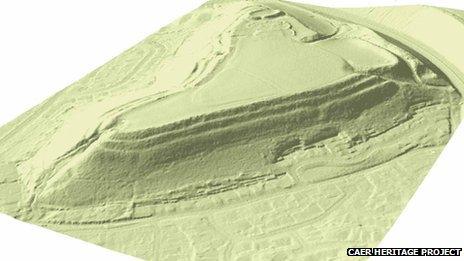Dig for Iron Age hill fort in Ely, Cardiff
- Published
BBC Wales Today's Nick Palit went to view the dig and spoke to Dr Oliver Davis from Cardiff University.
Archaeologists are starting a dig in Cardiff at what is being classed as a significant Iron Age hill fort.
Limited trial excavations at the fort in Ely, next to a link road from the M4 in the west of the city, took place last year.
Evidence of Iron Age pottery was found along with Bronze Age and Roman activity as well as Norman ringwork.
The Norman fort is next to a 13th Century church which is now a fragile ruin.
It is believed the fort was once a stronghold of the powerful Silurian tribe who inhabited this part of Wales before the arrival of the Romans.
Dr Dave Wyatt, a lecturer in early medieval history and community outreach at Cardiff University, is behind the project.
"People have know about it for quite a long time but what's interesting is that no-ones ever thought to research it," he told BBC Radio Wales.
"The Romans in the early days of archaeology always attracted all of the interest and there is in fact a Roman villa near by in Ely in Trelai field which was excavated in the 1920s.
"This enormous hill fort is monumental - it's one of the biggest and most impressive historical sites in Cardiff yet no-one really knows about it.
"There's been no research about it until we started our project about two years ago. Our project is working with archaeologists and the community.
"It's very much a community project... to rediscover and find out about the heritage of this amazing site and to try to put it back on the map."
He added: "The pottery dates to around 600BC so that gives you some kind of idea as to how long this Iron Age hill fort was in occupation before the Romans even showed up.
"It really was a power centre for the whole of south east Wales."

An impression of the Ely hillfort
- Published24 June 2013